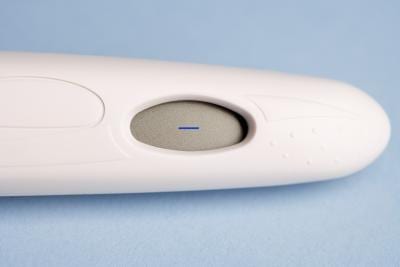Menstruation or your monthly period, is a normal, natural part of womanhood. Most young American women get their first period when they are about 12. Women who do not experience their first period by the time they reach 16 years are said to have primary amenorrhea. Secondary amenorrhea refers to the condition of women who have had a menstrual period, but whose periods have stopped. Secondary amenorrhea is usually the result of pregnancy, but there are other reasons a woman may not have a period.
Function
A woman’s regular monthly period is the result of a complex set of hormonal and physical factors surrounding her reproductive organs. All females are born with egg follicles that mature into egg cells during their reproductive years. Hormones trigger the release of a mature egg into the fallopian tubes once each month. If the egg is fertilized by a sperm cell, the egg will attach itself to the lining of the uterus and a pregnancy occurs. If the egg is not fertilized, the uterine lining is sloughed off and expelled, along with the unfertilized egg, as part of the menstrual flow.
Identification
The most common reason for women who are healthy and sexually active to miss their period is pregnancy. There are a number of other factors that can cause a woman who is not pregnant to miss her period. Few of these reasons are serious, but not knowing the reason for a missed period can cause a certain amount of stress. It is unlikely that a woman can determine the cause of missed periods on her own without the help of a medical professional.
Common Causes
The absence of a menstrual period may be caused by certain medications, including oral contraceptive birth control pills. Other types of contraceptives, such as intrauterine devices and injections, may also result in missed periods. Women may miss their periods while breast-feeding, but MayoClinic.com cautions that nursing mothers may ovulate and could get pregnant even if they are not having their monthly periods. Low body weight, excessive physical exercise, stress and certain eating disorders, such as bulimia or anorexia, can affect the hormones that trigger menstruation resulting in missed periods.
Prevention/Solution
Sexually active women who miss a period should take a pregnancy test to rule out the possibility of pregnancy before taking any other steps. Women who miss three consecutive menstrual periods, and who know they are not pregnant, should seek medical care from their primary care physician or gynecologist, according to the National Institutes of Health. Women should prepare for their visit by making a list of their symptoms, all medications including food supplements they take, recent lifestyle changes and questions regarding treatment options.
Considerations
A missed period is not a disease, but a symptom of some other underlying condition. While it is important to determine the root cause of a missed period, in most cases the underlying condition is not serious and can be treated with proper diet, lifestyle changes or alternate medications. Most women will resume having normal menstrual cycles once the underlying condition is properly treated. One exception is menopause, which will stop a woman’s monthly period permanently.





